Russia Hosts Afghan Talks, Calls On US To Participate
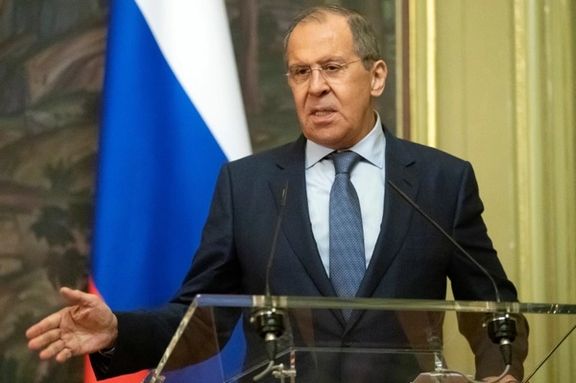
Russia has hosted talks about Afghanistan on Wednesday involving senior representatives of the Taliban, Iran, China, Pakistan and India.

Russia has hosted talks about Afghanistan on Wednesday involving senior representatives of the Taliban, Iran, China, Pakistan and India.
The talks coming amid uncertainty about the impact of the Taliban rule is a round of diplomacy that underlines Moscow's continuing influence in the region.
Opening the meeting, Russian Foreign Minister Sergey Lavrov expressed regret that the United States had chosen not to send a delegation, saying he hoped the US would attend future talks.
He said the Taliban was now in power in Afghanistan and there was no alternative to this for the foreseeable future.
His comments reflected Russian President Vladimir Putin's comments last week that although there should be no rush in officially recognizing the Taliban as the new rulers of the country, it was necessary to engage in talks with them.
Lavrov emphasized the security challenges posed by the Islamic State group and other militants based in northern Afghanistan and noted that drug trafficking from Afghanistan would continue to present a challenge.
Iran has also voiced concern over recent terror attacks targeting the Shiite minority in Afghanistan, attributed to the Islamic State group.
With reporting by AP
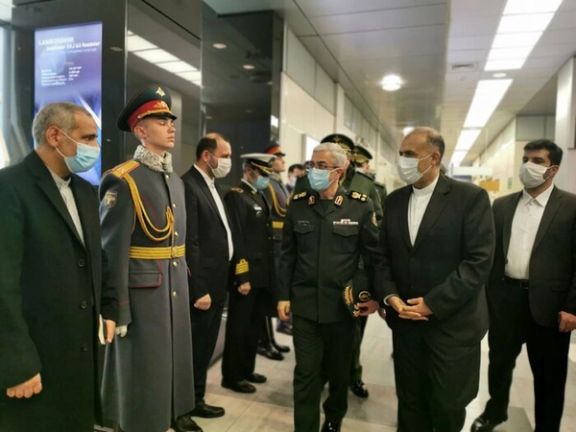
Iran’s military chief of staff who is visiting Moscow has said that Supreme Leader Ali Khamenei attaches “special significance” to expanding ties with Russia.
General Mohammad Bagheri who has been on an official visit to Russia this week told the official government news website, IRNA, that the Russian Iranian military alliance in Syria is an example of extensive cooperation and added, the two countries made a lot of efforts “to protect Syria’s sovereignty”.
Iran entered the Syrian civil conflict as early as 2011, deploying advisors and troops to help the embattled government of Bashar al-Assad. Russia joined the war in 2015 by deploying its air force that together with Iran-organized ground troops largely defeated the rebel forces.
Bagheri went on to say that Russia and Iran have always supported one another on the international arena and “on the military front there is not any kind of misunderstanding and lack of clarity.”
The top Iranian military commander described bilateral relations as “growing and expanding”, insisting that Khamenei and President Ebrahim Raisi (Raeesi) “attach special significance to expansion of relations with Russia.”
Khamenei, who has always spoken against the United States and Western European powers, insists that Iran should pursue an Eastern strategy, developing closer ties with China and Russia.
While he has banned direct talks with the US, and even earlier this year banned American and British Covid vaccines, Khamenei advocates self-reliance and cooperation with non-Western countries and blocks. His beliefs dominate the thinking among his hardline supporters who now control all three branches of the Iranian government.
Bagheri, referring to the United Nations arms embargo on Iran that expired last year, said that Tehran is pursuing arms deals with Moscow and his visit was aimed at discussing agreements. Bagheri added that the joint Russia-Iran military commissions will meet in Tehran in the next three months.
So far, Russia has not publicly committed to supplying new weapons to Iran, but Bagheri said on Monday that agreements have been signed to buy warplanes and helicopters from Russia.
As the fate of nuclear negotiations between world powers and Iran remains unclear, Russia can play a pivotal role in pressuring its ally to be flexible and return to the talks that were suspended in June by Tehran.
Iran, on the other hand, tries to highlight its relations with China and Russia to show the West that it is not so much dependent on an agreement and can save its economy by working with West’s competitors. But except some clandestine oil purchases, China for example has generally respected US sanctions. More than the Chinese government, large companies are wary of going business with Iran, concerned about retaliation by the United States.
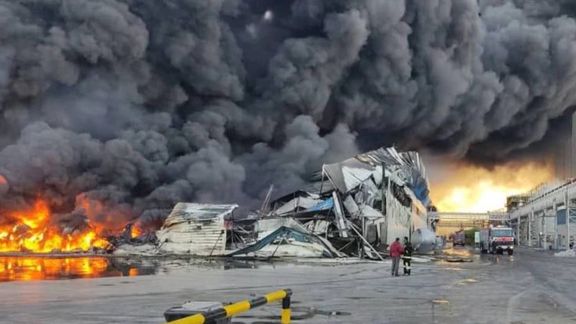
A large blaze with unknown origin broke out in a food processing plant in central Iran early Wednesday that according to local media has destroyed the factory.
The plant processes and packages tea and cooking oil. The fire started at 3:00 am according to the manager of the factory. He described the cause of the blaze as “internal” but gave no further details. According to the local governor, Siamak Soleimani, two people have been injured, but images published show extensive flames raging in the complex.
The packaging section and the warehouse of the plant located in an industrial zone have completely burned down.
Law enforcement personnel and firefighters rushed to the scene trying to battle the fire, but Soleimani told the media that the building was still burning in during rush hour. The police chief in the area was one of the injured persons as he tried to fight the fire.
There have been a series of mysterious fires and explosions in Iran’s nuclear, military and industrial facilities since July 2020.
In one such incident lately, a large blaze broke out in an electrical motors manufacturing factory in Shahre Kord, west-central Iran on September 27.
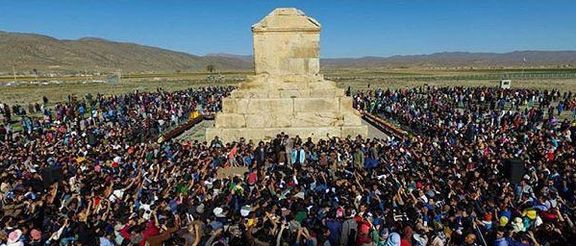
Many ordinary Iranians will mark the Day of Cyrus the Great on October 29, which can turn into a politicized event the Islamic government might try to prevent.
While authorities have been making every effort during the past years to keep the Day of Cyrus the Great a low-key event and to dissuade Iranians from visiting his tomb at Pasargadae, blunders by President Ebrahim Raisi and one of his ministers alerted everyone in Iran that Cyrus Day (October 29) is approaching.
Last week, during a visit to Fars Province in southern Iran, where the 6th century BC Achaemenid monuments Persepolis and the Tomb of Cyrus the Great (circa 600-530 BC) the celebrated Achaemenid king is located, Raisi denounced the Achaemenids as "oppressors" while the ancient dynasty, particularly Cyrus the Great are internationally known as champions of human rights and toleration for religious and ethnic diversity.
Culture and Tourism Minister Ezatollah Zarghami made a bigger and more controversial blunder during his visit to Pasargadae last week. In the countryside, where digging too many wells as well as mismanagement of other water resources, have created massive sinkholes across the Iranian plateau, Zarghami suggested that the government should allow more wells around the historic site.
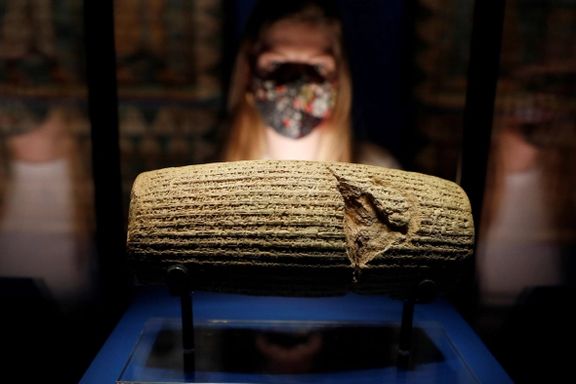
Critics in the press and on social media pointed out that even without new wells, the tomb of Cyrus may disappear in a deep sinkhole any day. Others charged on social media that Zarghami has forgotten that his role is protecting cultural heritage rather than boosting agricultural products.
A commentary on the Asr Iran news website reminded Zarghami that what he suggested was like "planting carrots on a gold mine." Zarghami soon retracted his comment when attacks escalated on social media, but the damage was done.
Social media users such as cultural activist Mohammad Bagher Tabatabai warned Zarghami that "The tomb of Cyrus the Great has a place in the heart of every Iranian. You can never destroy it."
During the past years, particularly after the 1979 Islamic revolution and despite Iranian officials' violent crackdown on pro-monarchy demonstrations, thousands of Iranians visited Pasargadae to pay tribute to the great ancient king. The celebration became a political event in October 2016 when thousands of visitors to the tomb began chanting slogans against the Islamic Republic.
The following year and every year since, the Revolutionary Guards (IRGC) deployed forces to the region and blocked all roads to Pasargadae to prevent the celebrations. But still, thousands of young men and women somehow managed to gather around the monument and sing patriotic hymns.
The commentary in Asr Iran website noted that "Zarghami has never been a tourist or a tour leader and has no experience about protecting cultural heritage. He is a former IRGC officer who has studied urban planning and industrial management. Although he has been deputy culture minister for cinema for a while, yet, surprisingly, someone like him is assigned to protect the country's cultural heritage."
The commentary reminded Zarghami that tourism can produce more financial resources than agriculture. The website suggested that Zarghami should look at Iran's neighbors such as Turkey and see how they make money from tourism. "Turkey's income from tourism is more than Iran's income from oil. Last year Turkey earned $29.5 billion from tourism," claimed the website citing Anatolia news agency.
In 1979, "hanging judge" Sadeq Khalkhali, who killed hundreds after the revolution, had a plan to destroy all monuments including Persepolis as heretic idolatry, but intellectuals and patriotic Iranians prevented the destruction of the sites. Later, most Iranian officials, particularly former President Mahmoud Ahmadinejad realized that they could count on public interest in Iran’s historical heritage to garner support. The blunders by Raisi and Zarghami could signal a return to the ideas of the hanging judge.
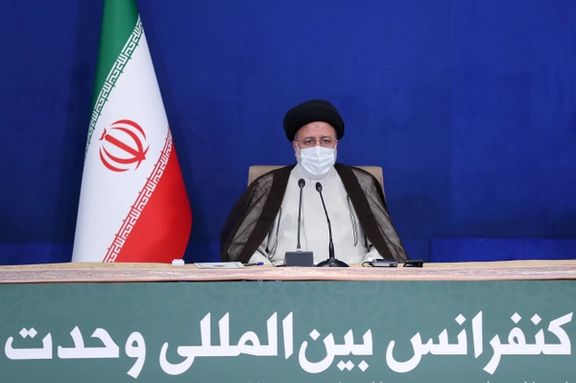
Iran’s president Ebrahim Raisi has said that young Iranians are not attracted to Western culture any longer, while hundreds of thousands emigrate every year.
In the 35th International Conference on Islamic Unity in Tehran on Tuesday Raisi said, “Western culture and political-economic systems are not attractive for the youth. If young [Muslim] people in the past wished to live in a Western cultural environment and lead Western lifestyles, today they do have such demands.”
Raisi’s statement comes across as a contradiction to years of statements by Islamic Republic officials who have been voicing alarm at the high rate of emigration and what is usually dubbed as a “brain-drain”.
On the same day when Raisi spoke, a prominent economist, Bahman Arman, told the Iranian Labour News Agency (ILNA) that 700,000 people leave Iran every year, citing figures by the Statistical Center of Iran. While economic reasons exist for migration, religious restrictions on social life is an important factor in encouraging relocation to other countries.
Raisi’s statement also contradicts a huge morality police force that arrests young people daily, especially women for preferring a free lifestyle and defying obligatory hijab and restrictions on mixed-gender social gatherings.
In 2017, a top official in the ministry of roads said that 1.5 million professional and educated Iranians are waiting to emigrate to Australia and Canada.
The Islamic conference is a public relations event organized by the Islamic Republic to show that there is unity among Shiites and Sunnis and to carve a place for the clerical regime among other Muslims.
Raisi in his speech also praised Qassem Soleimani, the former commander of the Qods (Quds) Force, claiming that the general who was killed by US drones in January 2020, was a leading figure in promoting Islamic unity. In fact, Soleimani was seen by many Sunnis as a dividing figure, bent on arming and using Shiites to advance Iran’s foreign policy goals in the region.
Raisi also said that after the second World War “the ruling system” only saw one power on its way to full domination and that was Islam. The statement is not compatible with history that witnessed an epic rivalry between the United States and the Soviet Union, or capitalist democracies and Communist dictatorships. Political Islam did not emerge as a force until the late 1970s.
Iran’s hardline president went on to say that there is an “Islamic awakening” now that should not “go cold”. He accused the West of conspiracies such as allegedly creating the Islamic State group and dividing the Muslim world. He called on the participants in the conference to unite against conspiracies and defend the Palestinians, which he said is the most important issue for the Muslim world.
Raisi told the conference that the Islamic Republic pursues stability in Muslim countries while “the enemy” is bent on creating instability. The term ‘enemy’ for the Islamic Republic usually means the United States and Israel.

Production of the Fakhravac Covid vaccine, one of eight Iranian inoculations developed by the defense ministry is to stop due to lack of demand as imports grow.
Ahmad Karimi, head of the Fakhravac project, told the Iranian Labour News Agency (ILNA) Tuesday there was a lack of demand for the vaccine, even though 1 million doses had been produced with a first batch ready for use.
Karimi complained that the project had received 10 million euros ($12 million) in advance purchase from the government while other domestic vaccine developers received 40 million each. He added that with the increasing rate of vaccinations in Iran, Fakhavac had struggled like other projects for home-grown vaccines, to recruit volunteers.
"We expected to have between 1,000 and 1,500 volunteers a day, but the number has dropped to around 100,” he said. “It has become a challenge because in the third phase of the clinical trial the sample groups need to be large.”
The deputy head of the Food and Drug Administration (FDA), Heydar Mohammadi, told Borna news agency Tuesday that the FDA was considering full authorization for third- booster shots of both Fakharavac and Razi Cov Pars, developed by the Razi Vaccine and Serum Research Institute and in a third clinical research phase.
Iran has now fully vaccinated 25 million from a population of 84 million, with 60 million doses of China’s Sinopharm making up a majority of 72.6 million (first and second) doses administered. The main domestically produced vaccine, Barakat, accounts for 5.7 million doses.
Fakhravac, produced by the defense ministry's Organization of Defensive Innovation and Research (ODIR), entered the third clinical trial phase after being authorized for emergency usein early September. The defense ministry in September said a factory was being built to produce 1 million doses monthly of Fakhravac, which is named after Mohsen Fakhrizadeh, the nuclear scientist assassinated in November 2020, allegedly by Israel.
Major-General Hossein Salami, commander of the Revolutionary Guards (IRGC), said in August that Noora, a second vaccine being developed by the defense ministry, at the IRGC's Baqiyatallah University of Medical Sciences, was in the second stage of human trials.
Iran's other main vaccine authorized for emergency use, CovIran Barakat, was developed by Barakat Foundation, a charitable body and business group that is an affiliate of the Execution of Imam Khomeini’s Order Foundation. The foundation is a charitable-cum-business state entity answerable to the Supreme Leader Ali Khamenei.
CovIran Barakat, failed to meet a delivery target of 50 million doses by the end of September. In a radio interview in August Hossein-Ali Shahriari, the conservative chairman of parliament’s health committee, said that awaiting homegrown vaccines had slowed down imports and so the rate of vaccinations.
More than 124,000 have died of Covid in Iran according to official figures, that are deemed to be much less than real numbers, by critics who say the government has under-reported the pandemic toll. The death rate has decreased in October as vaccination increased since August, but some health officials have warned of a sixth wave in the coming weeks.